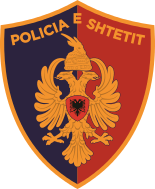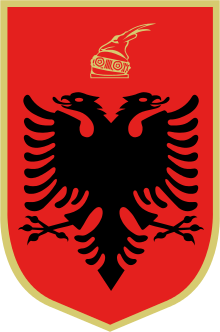Albanian Police
| Albanian State Police Policia e Shtetit | |
|---|---|
|
Logo of the Albanian Police | |
| Agency overview | |
| Formed | 1913, 1991 |
| Employees | 12636 employees |
| Legal personality | Governmental: Government agency |
| Jurisdictional structure | |
| Governing body | Ministry of Interior |
| General nature | |
| Operational structure | |
| Headquarters | Tirana |
| Agency executive | Haki Çako, General Director |
| Child agencies |
|
| Website | |
| Albanian Police | |
The Albanian State Police is the national police and law enforcement agency which operates throughout the Republic of Albania. The collapse of the Communist system and the establishment of political pluralism post-1991 brought important changes to the structure of the Albanian Police. The Ministry of Public Order and the General Directorate of Police was established in April 1991, and the new law of July 1991 established the Public Order Police. Nearly 80% of police manpower, i.e. personnel who had served under the previous system, were replaced by new recruits. On November 4, 1991, the Albanian Police was accepted as a member of INTERPOL. The emergency number is 129.
History
The original Albanian Police was founded on 13 January 1913 by the government of Ismail Qemali, Albania's first prime minister.[1]
The crisis of 1997
Following the collapse of the Albanian economy in January–February 1997 in the wake of the implosion of the Ponzi pyramid banking schemes promoted by the government,[2] increasing insurgency in early March led to the Police and Republican Guard deserting en masse because it became clear they were unlikely to be paid, leaving their armouries unlocked,[3] which were promptly looted by parties unknown, believed to mostly have been the local crime bodies and self-appointed militias: many of the weapons eventually surfaced in the ethnic fighting in Kosovo.

The resulting anarchy led a number of nations to use military forces to evacuate citizens,[4][5] culminating in the UN authorising Operation Alba ("Daybreak"), a short-term military stabilisation force led by the Italian Army, tasked with facilitating the repatriation of foreigners and laying the foundations for another International Organisation to undertake the longer-term restabilisation. The political debate eventually settled in Europe within the body responsible for the defence diplomatic coordination of the Continent, the Council of the Western European Union. In a 2-hour meeting which convened at 1400 hrs on 2 May 1997,[6] the WEU Council decided on the immediate establishment of the Multinational Advisory Police Element, sending a pathfinder officer, a Norwegian Police Colonel, the same evening. The Italian force in Operation Alba predicated the Command structure of MAPE passing into the Italian Carabinieri, General Pietro Pistolese, previously commanding the Genoa region, bringing his team with him. Four phases followed, assessment, reconstruction, support of the Albanian Police control during the Kosovo Crisis, and finally build-down and handback in early 2001, which was somewhat accelerated ahead of the transfer of the WEU's operational responsibilities to the Council of the EU on 30 June 2001. The reconstruction principally involved the reconstruction of the Judicial system and the training of Police, but the Finance section also accommodated economic specialists acting as the principal feedback into the correction of the Judicial system. The Command Team later formed the core of the European Union Border Assistance Mission Rafah from 2005 onwards.
Public Perception
According to a survey produced in 2009 for the United States Agency for International Development Albanian's perception of the police was as follows:[7]
- On a scale of 0-100 with 0 being Very Honest and 100 being Very Corrupt, Policemen were given a score of 63.1 points
- When asked to what extent the police help to fight corruption, 0 being Not at All and 100 being Helps a Lot, the Police were given a score of 45.5
- When asked about trust in institutions, 0 being No Trust at All and 100 being Trust a Lot, the Police were given a score of 47.8
- When asked if during the previous year they had been asked for a bribe 7.8% said Yes
- "When asked how they were treated by the police, the proportion of respondents that replied "Poorly" or "Very poorly" was 26.6%, a decrease of 10.9 percentage points from 37.5% in 2005"
Given that this was within eight years of the departure of the MAPE rebuilding mission, great concern must be expressed about the capacity of the police force to maintain the legal norms required of an aspirant EU State.
Modernization and the Future
In 2014, the Ministry of Internal Affairs started a modernization process of the Albanian police, to modernize it's equipment and methods. The first step was the acquisition of new police vans and cruisers, the next one was the installment of body cameras on police officers to improve their service and to be analysed after an operation. Uniforms of the every uniformed department of the Albanian police were overhauled and the logo was changed also.
Several operations were held from the years 2014 to 2016, in various criminally active regions of Albania (i.e. Lazarat) to restore confidence and belief of the Albanian public to support the actions of police. Body cameras are becoming an integral part of the Albanian police, used on various drug busts and high-profile operations, released afterwards to the public
Equipment
Footnotes
- ↑ "Eighty-fifth anniversary of Albanian police founding commemorated", Albanian Telegraphic Agency, 11 January 1998
- ↑ "Collapse of the Ponzi schemes 1997". International Monetary Fund. Retrieved 2015-03-09.
- ↑ Albanian Rebellion of 1997#Opening of the depots
- ↑ Operation Silver Wake
- ↑ Operation Libelle
- ↑ "NL MOD History of MAPE". Dutch Ministry of Defence. Retrieved 2015-03-09.
- ↑ "Corruption in Albania 2009 - Summary of Findings". Institute for Development Research and Alternatives. Retrieved 2010-09-09.
Gallery
-

Cars used by ASP
-

Albanian Police Patrol along SH1 Highway
-

Albanian Police Training
-

RENEA Special Forces Showcase in Tirana
-

Cruisers of the elite Albanian police unit 'Shqiponjat' (Eagles)
-

New Albanian police van
-

Albanian police officer of 'Shqiponjat' intervention group displaying his new uniform and the new motorcycle unit of the group
-

Body cameras of the Albanian police
-
Albanian police in Tirana
-

Albanian police officer overlooking the cutting off of illegal cables stealing electric energy
See also
- Sigurimi, the former secret police force
- RENEA Special intervention group
- Shqiponjat (police unit) elite unit of the Albanian police
External links
| Wikimedia Commons has media related to Category:Police of Albania. |

